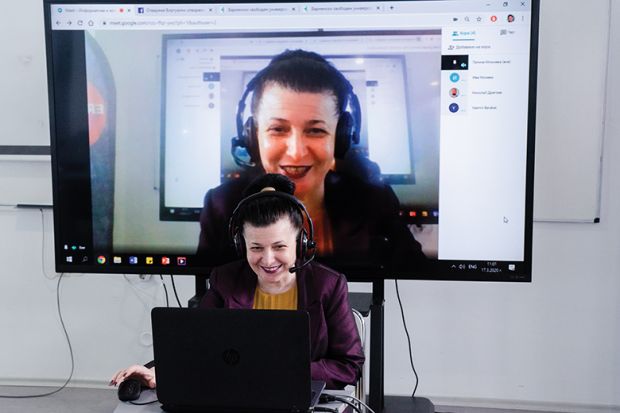When lecturers were asked to reimagine their classroom-based courses as online experiences earlier this year, it was not just their digital skills that many reassessed.
“I’ve found myself learning valuable lessons as a teacher,” explained Noam Schimmel, lecturer in international and area studies at the University of California, Berkeley, on how his time teaching human rights seminars during coronavirus lockdown triggered a broader reappraisal of his teaching methods.
For Dr Schimmel, the enforced period as an online educator made him particularly conscious of less confident students who were often reluctant to join student debates, at least at the start of term.
“Some students who initially may be reticent to speak in a seminar will, over the course of a semester, often start to feel more comfortable speaking out as familiarity with fellow students and the course material grows, and the class becomes community,” he said.
Developing that kind of “esprit de corps with a distinctive sense of humour and class culture” was inevitably harder to achieve when teaching online, but the different format offered a chance for less voluble students to contribute in other ways, Dr Schimmel observed.
“Several of my students who tended to be fairly quiet during a seminar became much livelier in online Blackboard postings and seemed to feel uniquely comfortable expressing themselves in that format, which may have created less of the stress and anxiety that public speaking in a classroom can generate for some students,” he reflected.
Female students, in particular, tended to value the opportunity to contribute following online student seminars, and those less comfortable talking in class were able to post their thoughts with “greater vigour, confidence, detail and often greater verve” than they had, explained Dr Schimmel.
When in-person seminars resume, he aims to find a way to encourage these post-hoc comments from students who prefer to contribute in this slower, more considered way, he said.
The dynamics of online seminars held in lockdown − in which some individuals take centre stage and others remain largely silent – may also be a useful wake-up call for scholars to address the tendency of some students to “monopolise” seminars, believed Theo Gilbert, associate professor of learning and teaching at the University of Hertfordshire.
“We have to ask how we can do better on this, as…once it starts happening, it often sets the whole dynamic for the semester, causing a lot of resentment,” said Dr Gilbert, who argues that universities should incentivise collegiality and “compassion” in the classroom by rewarding students who enable others to contribute by inviting quieter peers, who were often international students, into debates.
“Often the monopoliser will lock eyes on one person when talking, so it’s also up to that person not to become a ‘colluder’ and to move things on, otherwise they will lose marks,” explained Dr Gilbert, who was named Times Higher Education’s Most Innovative Teacher of the Year in 2017.
Online discussions on Zoom and Skype have confirmed how those chairing debates must actively bring others into the discussion, which is admittedly a challenge when some students specifically ask their tutors not to put them on the spot, said Dr Gilbert.
“When this happens, I tell students their fear and threat systems are overwhelming all other parts of their brain and, yes, they will feel afraid, but it is important that they are included,” he explained. “If they really don’t want to answer a question, they can pass it on to another student and they will get marks for helping another student talk,” he said.
Allowing students to solicit opinions from their peers in this way tended to encourage the free flow of discussion and was transformative to a class’s cohesion and morale, he believed.
“Coming to the aid of another student is a very different experience than being put on the hot spot by a tutor, and it invites many more contributions from others in the group,” he said.
Sara Wolfson, staff tutor and lecturer in history at the Open University (OU), who won THE’s teaching award in 2016, said she hoped many of the technology-aided practices adopted at scale in lockdown, such as the release of recorded lectures and the use of online chat boxes to encourage student collaboration, would continue when campuses reopened.
“It is refreshing to see how some of the things used by the OU for years – such as academics doing podcasts or running contact hours online − have been picked up by other universities,” said Dr Wolfson.
“As much as I love, as a historian, a good lecture, we have seen how students tend to value opportunities to collaborate with each other far more than a one-hour talk,” said Dr Wolfson, who added that the interactive technologies embraced during the pandemic – in part to tackle student isolation and loneliness – must continue to be rolled out further.
“I don’t think we can go back to the old days when students were solitary learners, because the collaboration between them that we’ve seen in lockdown has been phenomenal, and I’m excited to see how it will transfer into mainstream university teaching,” she said.
POSTSCRIPT:
Print headline: Lecturers take lasting lessons from lockdown
Register to continue
Why register?
- Registration is free and only takes a moment
- Once registered, you can read 3 articles a month
- Sign up for our newsletter
Subscribe
Or subscribe for unlimited access to:
- Unlimited access to news, views, insights & reviews
- Digital editions
- Digital access to THE’s university and college rankings analysis
Already registered or a current subscriber? Login








